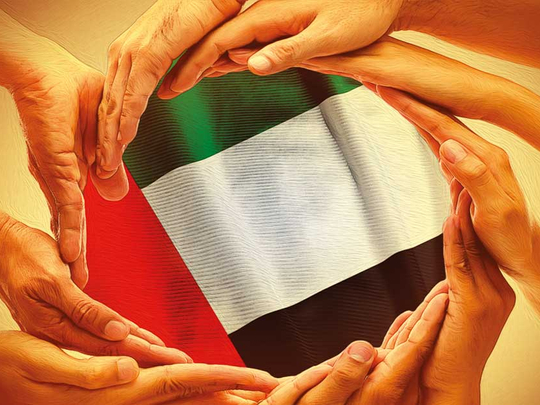
Not quite half a century ago, on December 2, 1971, hours after they wrested their independence from Britain, seven states in the Gulf region came together to create the United Arab Emirates — today considered one of the fastest growing, most innovative political entities in the world, where people representing well over 100 nationalities live, work, produce and play together.
So why shouldn’t Emiratis dispense with modesty and tell you that their experiment in social engineering has come to embody, down to a tee, Henry Ford’s aphorism, “Coming together is a beginning, keeping together is progress, working together is success”? And let’s do away with that ethnocentric observation by Cecil Rhodes, the English-born South African politician who, to his dying day in 1902, believed ardently in the superiority of the “Anglo-Saxon race”, and who claimed — one presumes, with a straight face — that “to be born an Englishman is to win first prize in the lottery of life”.
Happily, we have moved on since those timeworn days, when analysts were convinced that, to find why certain countries succeed and others fail, you first look for their racial pedigree, much in the manner, in the old fable, of the man who persists in searching for his lost keys under a street lamp (even though they were clearly not there) “because that’s where the only light was”.
Critics often accuse — yes, that’s the right word — Emiratis of having “quite high self-regard”; but those in the United States have the same accusation for their concept of “American exceptionalism” and the French of their “La mission civilizatrice” (the civilising mission). It may be true that Emiratis hold themselves in high regard. And why not? Theirs is a nation that, though a mere five decades ago was a “quiet backwater”, whose economy depended on fishing and a dwindling pearl industry, nevertheless, has catapulted itself into history as a multicultural habitat, a cultural hub and a player in the global dialogue of cultures.
What is not in dispute is that the UAE has launched a new Arab cultural renaissance. Go there: Look away for a moment from the marvel of the skyscrapers — a glittering metropolis rising from the desert — and consider how this little nation has transformed itself into a fulcrum for the arts, cinema, music, literature, dance and academic discourse, where creative folks from all over the world mingle, connect and exchange ideas, engendering a communal sense of reference among nations and people.
Consider the Guggenheim Abu Dhabi, for example, which will bring together a significant collection of artworks from countries both West and East. Cinema Akel, which has screened indie movies from literally every country around the globe where independent cinematic art is produced. The Women’s Museum, which has explored the role of women in politics, academia and business. Tasjkeel, which has facilitated cross-cultural and artistic exchanges. The Artspace Gallery, which welcomes patrons that include art collectors, architects and designers. And the Dubai Theater and Arts Center, which hosts events for the city’s mutinational community.
And, yes, lest we forget, consider also the Louvre Abu Dhabi, the long-awaited centrepiece of a multi-billion dollar complex, representing the first overseas expansion of Europe’s most revered art institution, which opened recently.
That is not to name the countless concerts held over the years, showcasing musical performances by bands and solo artists from all over the world. That, I say, is precious. And it is precious for one reason: Music is the one language that humanity shares together, for we know of no society on earth that does not have music. Not one. Even the most unsophisticated society we encounter in the Amazon or in the Gobi Desert, that possesses no written literature, has music. Thus, when we share each others’ music, we understand each others’ feelings.
But the role that the diffusion of culture, whether high or low brow, plays in the UAE is to essentially bring nations together by showing the people of the world that the more inclusive one’s culture is the more expansive one’s view of the world becomes. That is, the more we are induced to believe that we are all guests in each others’ homes, all brothers and sisters under the skin, and that human communities no longer need to go after one another.
The future goal of the UAE was revealed at the high-level First Cultural Summit in Abu Dhabi last April, a conference that explored the future of culture and how its power could be used, benignly, to effect social change. There, the nation averred that it is sending a message to the world that “[Abu Dhabi] seeks to be a global thought leadership capital through its investment in culture. It is part of a recognition that cultural vitality is directly linked to economic vitality and intellectual vibrancy. It sends a message that the country seeks to be seen as cosmopolitan and that it strives to prepare its residents to operate on the global sage.”
Reminds one of the ‘assabiyeh’, what Ibn Khaldoon called cultural elan, of the Founding Fathers of the Islamic Commonwealth of Nations in the seventh Century, who appropriated culture freely wherever their eyes roamed, taking what they took not as conquerors but as borrowers, mastering it and transforming it to their measure, with the proud intent of surpassing what had gone before.
On the anniversary of its 46th National Day, The UAE is fighting fit and flying high. And that’s only the first act.
Fawaz Turki is a journalist, lecturer and author based in Washington. He is the author of The Disinherited: Journal of a Palestinian Exile. This is the first of an eight-part series to commemorate the UAE National Day.









